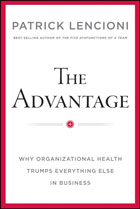 Every business searches for a sustainable competitive advantage. It looks for it finance, marketing strategy, yet as Patrick Lencioni argues, any advantages gained are "incremental and fleeting".
He writes: "In this world of ubiquitous information and nanosecond technology exchange, it’s harder than it has ever been in history to maintain a competitive advantage based on intelligence or knowledge. Information just changes hands too rapidly today."
If that's true, then where is the sustainable competitive advantage to be found? The answer is organisational health, by which he means when it has integrity, with its "...management, operations, strategy, and culture fitting together and making sense."
As Lencioni is the first to admit, there's nothing revolutionary about believing that a happy and motivated workforce can make a huge difference, but today's business leaders either regard it as too obvious to be a serious focus, or are too short-term to build the type of long-term culture necessary. In addition, they think it is too simple, or beneath them.
Lencioni identifies three biases that need to be overcome – sophistication (too simply), adrenaline (leaders like the daily rush of activity and are less good at slowing down and dealing with issues that are critical but don't seem urgent) and quantification (it can be difficult to measure).
Having made his case, Lencioni then introduces his "four disciplines model", which make up the core of the book — and the main central four chapters. These are:
Every business searches for a sustainable competitive advantage. It looks for it finance, marketing strategy, yet as Patrick Lencioni argues, any advantages gained are "incremental and fleeting".
He writes: "In this world of ubiquitous information and nanosecond technology exchange, it’s harder than it has ever been in history to maintain a competitive advantage based on intelligence or knowledge. Information just changes hands too rapidly today."
If that's true, then where is the sustainable competitive advantage to be found? The answer is organisational health, by which he means when it has integrity, with its "...management, operations, strategy, and culture fitting together and making sense."
As Lencioni is the first to admit, there's nothing revolutionary about believing that a happy and motivated workforce can make a huge difference, but today's business leaders either regard it as too obvious to be a serious focus, or are too short-term to build the type of long-term culture necessary. In addition, they think it is too simple, or beneath them.
Lencioni identifies three biases that need to be overcome – sophistication (too simply), adrenaline (leaders like the daily rush of activity and are less good at slowing down and dealing with issues that are critical but don't seem urgent) and quantification (it can be difficult to measure).
Having made his case, Lencioni then introduces his "four disciplines model", which make up the core of the book — and the main central four chapters. These are:
- Build a cohesive leadership team
- Create clarity
- Over communicate clearly
- Reinforce clarity.








